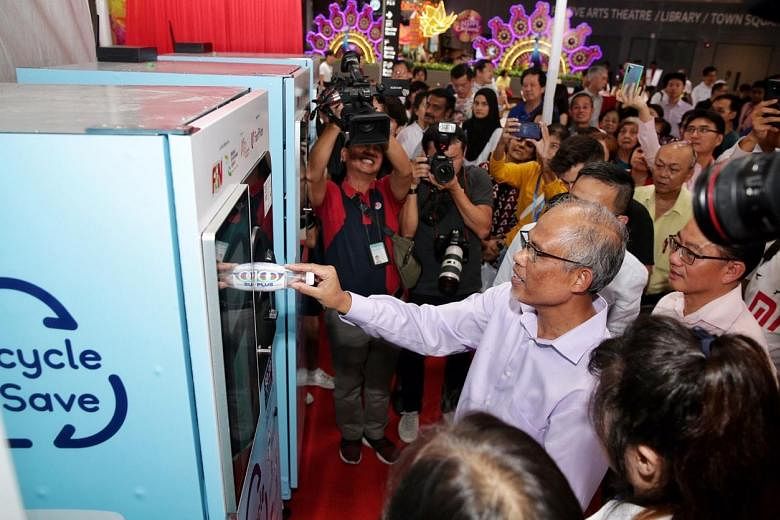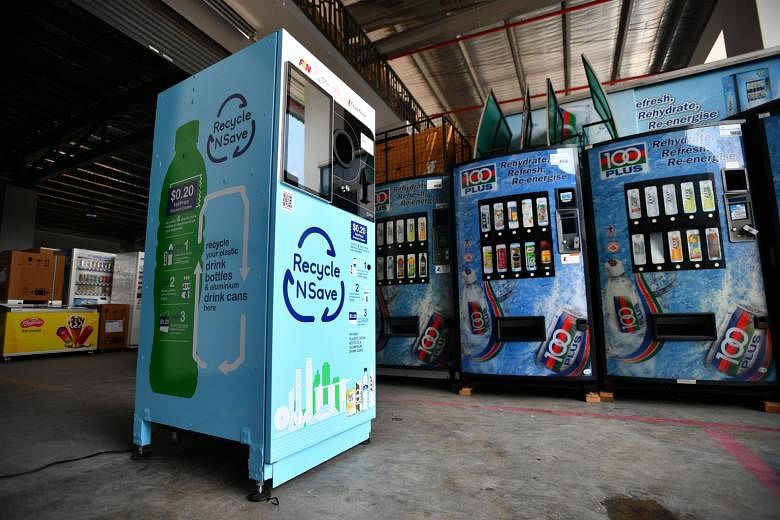SINGAPORE - In one corner of Our Tampines Hub stands a vending machine that is unlike any other found in the mall.
Instead of accepting coins and notes, it takes in empty drink cans and plastic bottles. And rather than dispense drinks, it gives out discount vouchers.
For every four drink receptacles deposited, a discount voucher worth 20 cents that can be used at any FairPrice outlet will be given.
This "reverse'' vending machine, like 49 others that will be progressively pushed out to various parts of the island by March next year, is the biggest initiative of its kind by the National Environment Agency (NEA) to encourage the public to recycle.
From Thursday (Oct 31), 10 of these machines at various shopping malls, including AMK Hub, NEX, Jurong Point and Paya Lebar Quarter, will begin accepting used receptacles. Most of them are located within the FairPrice supermarkets in the malls.
The Recycle N Save programme is a joint initiative by NEA and drink manufacturer F&N that is supported by NTUC FairPrice. It was launched following a favourable response from the public for the pilot that has been carried out at Waterway Point in Punggol since January last year.
The machine used at the mall for the pilot will be replaced with an updated set and will be part of the first batch of 10 rolled out on Thursday.
The "reverse" vending machines will help in efforts to tackle packaging waste, one of the priority waste streams - alongside food waste and e-waste - identified in Singapore's Zero Waste Masterplan, said Environment and Water Resources Minister Masagos Zulkifli at the launch at Our Tampines Hub.
He added: "Realising Singapore's vision of a Zero Waste Nation will require strong partnerships between the Government, people and businesses to co-create and co-deliver pragmatic solutions for our environment.
"Today's event is a wonderful example. We look forward to having more industry partners on board for future Zero Waste initiatives.''
NEA's chief executive Tan Meng Dui said the programme is part of the agency's effort to test different public collection systems, as it works towards implementing the Extended Producer Responsibility scheme for packaging waste over the next few years. The scheme makes manufacturers of products financially and physically responsible for the end-of-life collection and treatment of the items.
The new machines - which accept bottles of up to 2 litre capacity - are fitted with a compactor that flattens the drink cans and bottles to save space.
The revamped apparatus can hold up to 600 aluminium cans and plastic bottles, about five or six times its previous capacity, said Ms Jennifer See, managing director of F&N Foods Singapore.
Once the machine is 80 to 90 per cent full, an alert is automatically sent to the headquarters. The crushed bottles and cans will then be collected and amassed with other recyclables in the mall.

Mr Lee Meng Tat, chief executive of the non-alcoholic beverages division at F&N Foods, said: "With the launch of this initiative, F&N reinforces our commitment to play our part in protecting the environment by ensuring that our packaging is environmentally friendly and to encourage and reward consumers to recycle the cans and bottles."
The smart machine takes in only drink packaging made of aluminium and plastic and does not accept glass bottles.
Cans and bottles that are not fully empty will also be rejected. The machine has more than 1,000 different barcodes of drinks on the market in its database, and rejects items that are 20 per cent heavier than their weight when empty, said Ms See.
Tampines resident David Ho, 38, pointed out that the machine does not accept all plastic bottles as it recognises only selected barcodes.
"The machine is not too user-friendly as it doesn't recognise some barcodes, such as those on herbal tea bottles."
Ms See said the company is working to add new barcodes to the existing database in the vending machines.
"If we find any new barcodes, we are able to programme them to be accepted by the machines, provided they are plastic drink bottles or aluminium drink cans."
Mr Masagos said packaging waste is a concern, as it is generated in large quantities.
He hoped the initiative, with its incentive system, will encourage more people to recycle drink bottles and cans.
To find out where the reverse vending machines are located, visit http://www.recyclensave.sg/locations/



